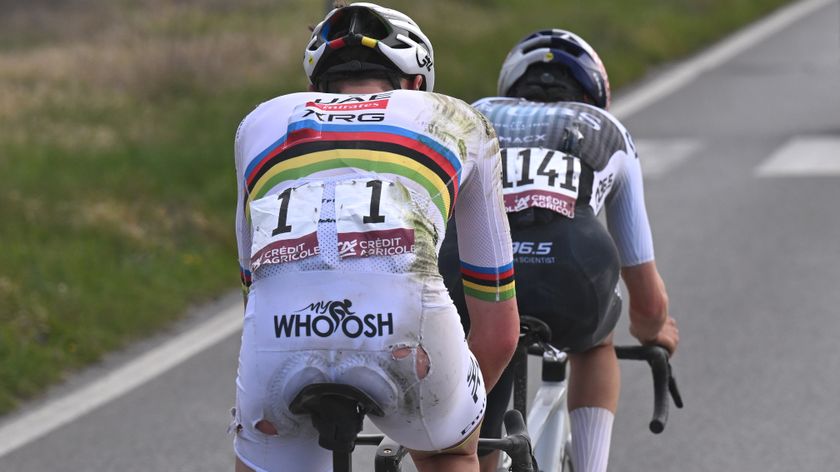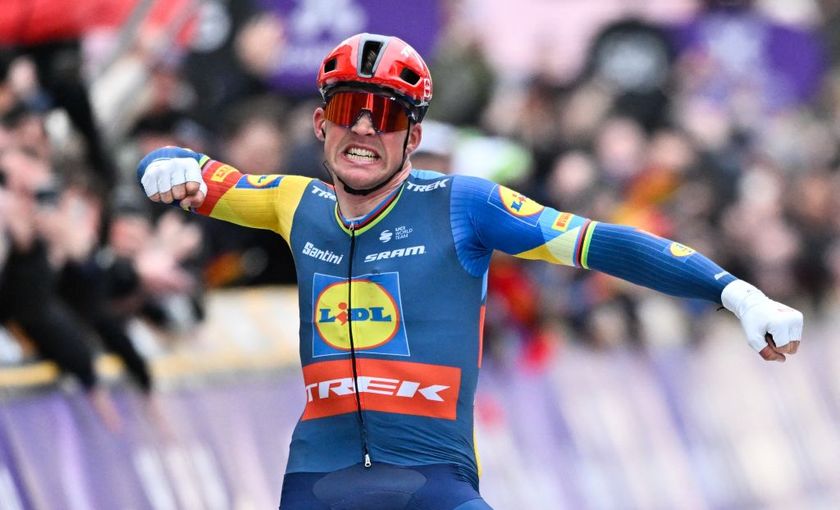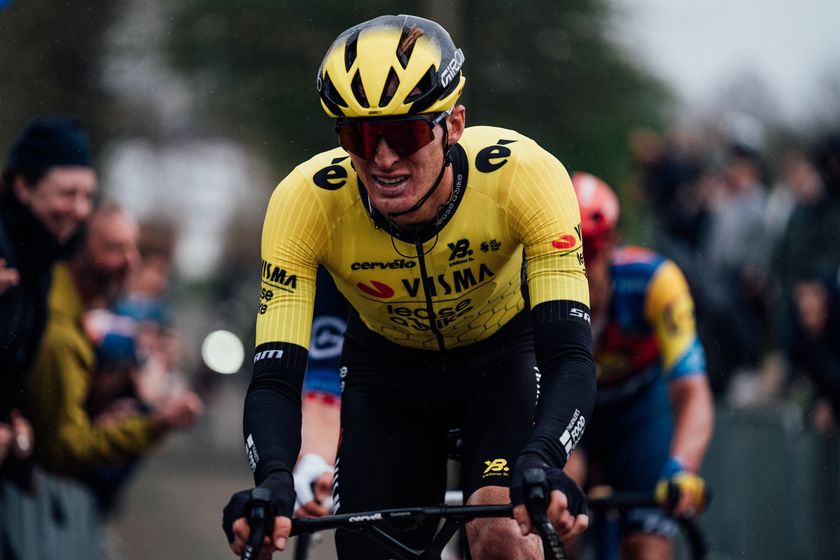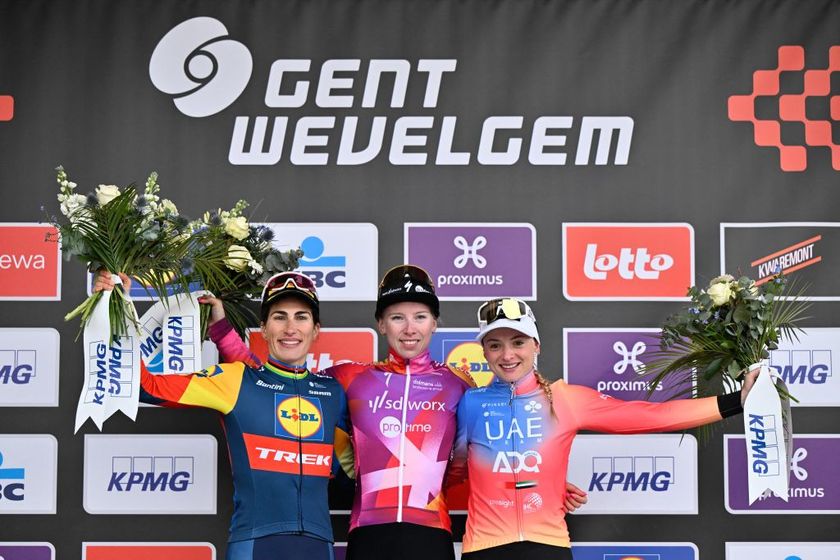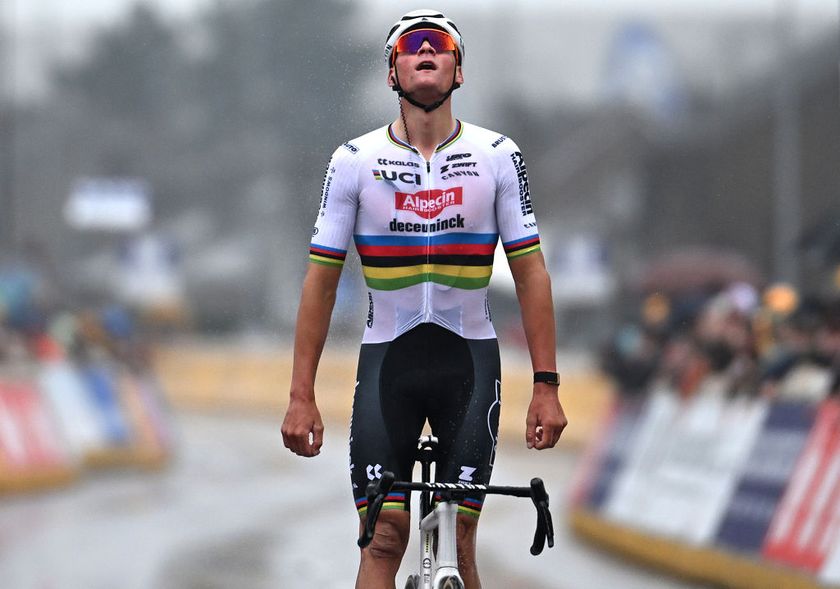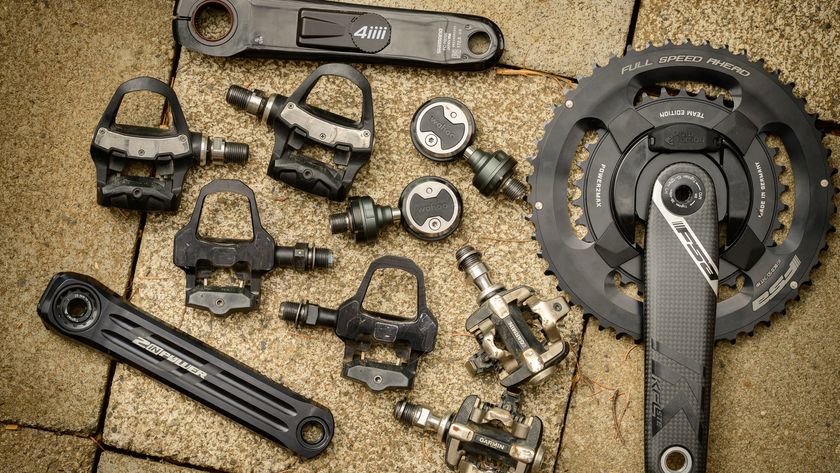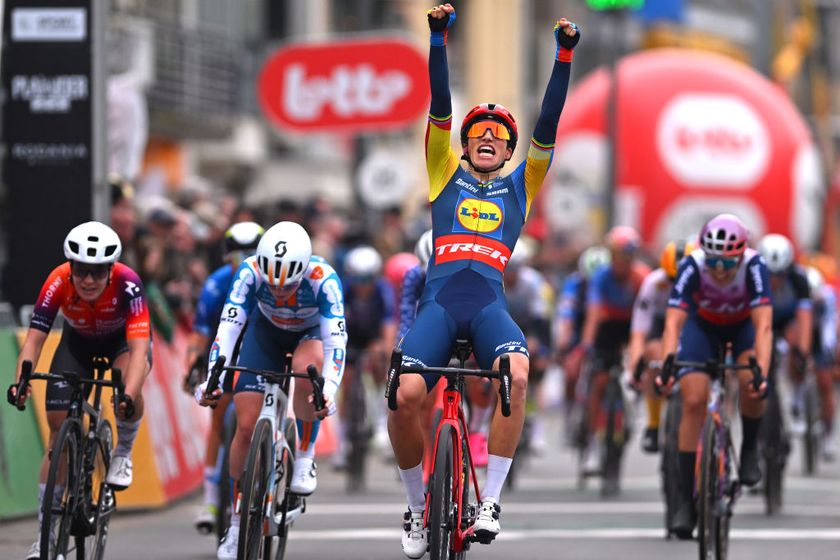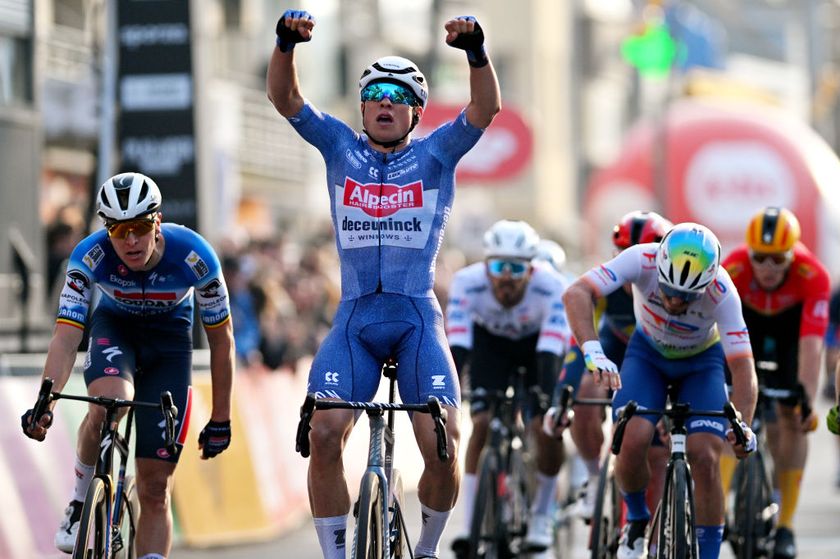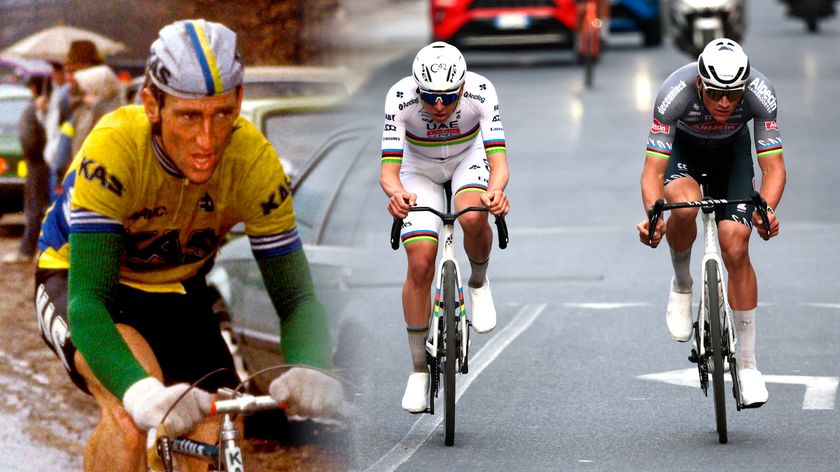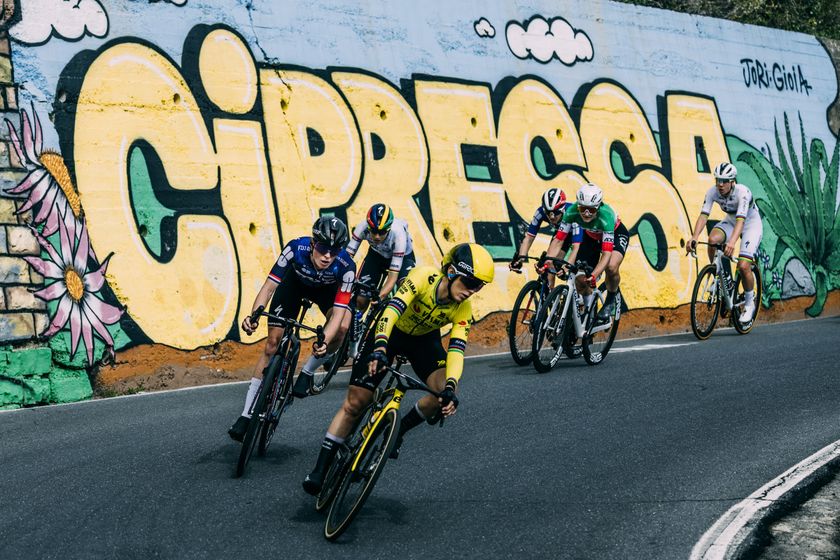Fitness questions and answers for May 24, 2004
Got a question about fitness, training, recovery from injury or a related subject? Drop us a line at...
Form & Fitness Q & A
Got a question about fitness, training, recovery from injury or a related subject? Drop us a line at fitness@cyclingnews.com. Please include as much information about yourself as possible, including your age, sex, and type of racing or riding.
Cyclingnews is delighted this week to welcome Pamela Hinton to our fitness panel.
Carrie Cheadle, MA (www.carriecheadle.com) is a Sports Psychology consultant who has dedicated her career to helping athletes of all ages and abilities perform to their potential. Carrie specialises in working with cyclists, in disciplines ranging from track racing to mountain biking. She holds a bachelors degree in Psychology from Sonoma State University as well as a masters degree in Sport Psychology from John F. Kennedy University.
Dave Palese (www.davepalese.com) is a USA Cycling licensed coach and masters' class road racer with 16 years' race experience. He coaches racers and riders of all abilities from his home in southern Maine, USA, where he lives with his wife Sheryl, daughter Molly, and two cats, Miranda and Mu-Mu.
Kelby Bethards, MD received a Bachelor of Science in Electrical Engineering from Iowa State University (1994) before obtaining an M.D. from the University of Iowa College of Medicine in 2000. Has been a racing cyclist 'on and off' for 20 years, and when time allows, he races Cat 3 and 35+. He is a team physician for two local Ft Collins, CO, teams, and currently works Family Practice in multiple settings: rural, urgent care, inpatient and the like.
Fiona Lockhart (www.trainright.com) is a USA Cycling Expert Coach, and holds certifications from USA Weightlifting (Sports Performance Coach), the National Strength and Conditioning Association (Certified Strength and Conditioning Coach), and the National Academy for Sports Nutrition (Primary Sports Nutritionist). She is the Sports Science Editor for Carmichael Training Systems, and has been working in the strength and conditioning and endurance sports fields for over 10 years; she's also a competitive mountain biker.
Eddie Monnier (www.velo-fit.com) is a USA Cycling certified Elite Coach and a Category II racer. He holds undergraduate degrees in anthropology (with departmental honors) and philosophy from Emory University and an MBA from The Wharton School of Business.
Get The Leadout Newsletter
The latest race content, interviews, features, reviews and expert buying guides, direct to your inbox!
Eddie is a proponent of training with power. He coaches cyclists (track, road and mountain bike) of all abilities and with wide ranging goals (with and without power meters). He uses internet tools to coach riders from any geography.
David Fleckenstein, MPT (www.physiopt.com) is a physical therapist practicing in Boise, ID. His clients have included World and U.S. champions, Olympic athletes and numerous professional athletes. He received his B.S. in Biology/Genetics from Penn State and his Master's degree in Physical Therapy from Emory University. He specializes in manual medicine treatment and specific retraining of spine and joint stabilization musculature. He is a former Cat I road racer and Expert mountain biker.
Since 1986 Steve Hogg (www.cyclefitcentre.com) has owned and operated Pedal Pushers, a cycle shop specialising in rider positioning and custom bicycles. In that time he has positioned riders from all cycling disciplines and of all levels of ability with every concievable cycling problem.They include World and National champions at one end of the performance spectrum to amputees and people with disabilities at the other end.
Current riders that Steve has positioned include Davitamon-Lotto's Nick Gates, Discovery's Hayden Roulston, National Road Series champion, Jessica Ridder and National and State Time Trial champion, Peter Milostic.
Pamela Hinton has a bachelor's degree in Molecular Biology and a doctoral degree in Nutritional Sciences, both from the University of Wisconsin-Madison. She did postdoctoral training at Cornell University and is now an assistant professor of Nutritional Sciences at the University of Missouri-Columbia where she studies the effects of iron deficiency on adaptations to endurance training and the consequences of exercise-associated changes in menstrual function on bone health.
Pam was an All-American in track while at the UW. She started cycling competitively in 2003 and is the defending Missouri State Road Champion. Pam writes a nutrition column for Giana Roberge's Team Speed Queen Newsletter.
Dario Fredrick (www.wholeathlete.com) is an exercise physiologist and head coach for Whole Athlete™. He is a former category 1 & semi-pro MTB racer. Dario holds a masters degree in exercise science and a bachelors in sport psychology.
Scott Saifer (www.wenzelcoaching.com) has a Masters Degree in exercise physiology and sports psychology and has personally coached over 300 athletes of all levels in his 10 years of coaching with Wenzel Coaching.
Kendra Wenzel (www.wenzelcoaching.com) is a head coach with Wenzel Coaching with 17 years of racing and coaching experience and is coauthor of the book Bike Racing 101.
Steve Owens (www.coloradopremiertraining.com) is a USA Cycling certified coach, exercise physiologist and owner of Colorado Premier Training. Steve has worked with both the United States Olympic Committee and Guatemalan Olympic Committee as an Exercise Physiologist. He holds a B.S. in Exercise & Sports Science and currently works with multiple national champions, professionals and World Cup level cyclists.
Through his highly customized online training format, Steve and his handpicked team of coaches at Colorado Premier Training work with cyclists and multisport athletes around the world.
Brett Aitken (www.cycle2max.com) is a Sydney Olympic gold medalist. Born in Adelaide, Australia in 1971, Brett got into cycling through the cult sport of cycle speedway before crossing over into road and track racing. Since winning Olympic gold in the Madison with Scott McGrory, Brett has been working on his coaching business and his www.cycle2max.com website.
Richard Stern (www.cyclecoach.com) is Head Coach of Richard Stern Training, a Level 3 Coach with the Association of British Cycling Coaches, a Sports Scientist, and a writer. He has been professionally coaching cyclists and triathletes since 1998 at all levels from professional to recreational. He is a leading expert in coaching with power output and all power meters. Richard has been a competitive cyclist for 20 years
Andy Bloomer (www.cyclecoach.com) is an Associate Coach and sport scientist with Richard Stern Training. He is a member of the Association of British Cycling Coaches (ABCC) and a member of the British Association of Sport and Exercise Sciences (BASES). In his role as Exercise Physiologist at Staffordshire University Sports Performance Centre, he has conducted physiological testing and offered training and coaching advice to athletes from all sports for the past 4 years. Andy has been a competitive cyclist for many years.
Michael Smartt (www.cyclecoach.com) is an Associate Coach with Richard Stern Training. He holds a Masters degree in exercise physiology and is USA Cycling Expert Coach. Michael has been a competitive cyclist for over 10 years and has experience coaching road and off-road cyclists, triathletes and Paralympians.
Kim Morrow (www.elitefitcoach.com) has competed as a Professional Cyclist and Triathlete, is a certified USA Cycling Elite Coach, a 4-time U.S. Masters National Road Race Champion, and a Fitness Professional.
Her coaching group, eliteFITcoach, is based out of the Southeastern United States, although they coach athletes across North America. Kim also owns MyEnduranceCoach.com, a resource for cyclists, multisport athletes & endurance coaches around the globe, specializing in helping cycling and multisport athletes find a coach.
HRMs and reported energy expenditure
Post race rest & recovery
Unexplained sickness
Track racing
Short, steep hills
Low weight
Cleat position and knee soreness
Caloric intake while riding & recovery
Vegetarian cycling
Coaches wanted
HRMs and reported energy expenditure
I've just bought myself a Polar HRM.
One of the functions it provides is to report a value of the energy expended for the measured exercise effort. The personal parameters that are set on the HRM are from the internal fitness test function (ie the predictive VO2 not from a lab test) plus weight, age, etc.
I was wondering just how accurate the energy expended measurements are likely to be -- are they within a reasonable figure, say +-10% or are they just a wild arse guess?
cheers
Steve
I remember reading study a few years ago that looked at oxygen consumption during endurance exercise and during resistance training at the same heart rate. Resistance training used roughly half the oxygen and half the calories of cycling at the same heart rate, so the heart rate monitor certainly cannot be accurate in judging calorie expenditure across such different types of activities. Later in a ride if you experience cardiac drift (higher heart rate for the same power output), the heart rate monitor would again not be able to accurately measure calories expended.
Post race rest & recovery
After every race I've had (especially crits), my heart rate always stays considerably elevated, impeding my attempts to take a post race nap. I usually manage to fall asleep after a good half-hour of fidgeting, and I always wake up a couple of hours later with my heart thundering in my chest, and not feeling as rested as I would like to be. I know to do some easy spinning for cool-down after every race, and although such makes my legs feel good, it fails to change the fact of my agitated cardiovascular system. Do you have any suggestions about what I could do to alleviate my problem? Also, since I'm a fledgling med student, can you explain some of the underlying physiology as to the problem and its solutions?
I'm a roadie, cat 4 (hopefully a 3 by the end of the season), male, 22 years old, 130 lbs, 5ft 6.5in and I like everything but long boring road races.
Victor Wang
Assuming that you are properly hydrated, the cause of your elevated heart rate (and feeling of agitation) is stimulation of sympathetic drive, also known as the stress response. Specifically it is stress hormones released by the sympathetic aspect of your autonomic nervous system that elevate heart rate. Have you noticed that even at the start line of a race your heart rate is significantly elevated?
Unexplained sickness
I am an 18 year old junior cyclist and lately I have been experiencing slight tiredness and sore, often achy legs. I took one week where I rode three days and took four off and the days I would ride would be an hour easy. After a week and a half of that I don't feel any better and when I finish the one-hour rides it feels as though I just rode four or five hours. Before I felt like this I was doing 16-18 hour weeks with low intensity during the week and racing on the weekends. I managed about 15-20 hours during the winter of base mileage as well. I have been riding since mid-October.
I went in for a blood test and everything is normal, including a Lyme test, mono test, and others tests which could explain for my symptoms including a look at my iron levels. Everything is normal. I have been taking a multi vitamin, b complex, iron, garlic and vitamin c and I cant say that any of it has had an improvement on my legs feeling like I just rode 100 miles.
I dont think I am overtrained as I was not doing an amount of riding which would lead to overtraining and I have taken a week where I should have at least seen an improvement in my condition. Whats going on?
Jeff Buckles
A couple of things could be contributing to your fatigue. The first possibility is that your body is just going through the normal adjustment that occurs with a shift from low-intensity to high-intensity and racing. This is more likely to be the case if this is your first competitive cycling season and if you are new to endurance sports. High intensity training rides and races cause much more muscle damage and require longer recovery periods than base miles. Continue to allow yourself regular rest days and your overtraining symptoms will get better with time as your body adapts.
Track racing
I've recently acquired an interest in racing track. What is the age range where one can be competitive?
I just turned 37 in great shape, train hard and have some strong abilities but am I too old to be a threat to the younger riders?
John Schultz
I hope not, I'm not far behind you at 33! Seriously though I think you've got some good years ahead of you. If you're looking for a couple of good examples then have a look at the Aussie track legend 'Danny Clarke'. I remember racing my first Madison World Championship with him in Colombia when I was 24 and he was 44. Also 'Etienne DeWilde' was 41 when he run second behind Scott and myself at the Sydney Olympics.
Short, steep hills
Short, steep hills are my greatest weakness. I can hang in there on fast pace lines, do reasonably well on long climbs, and can turn in a fast finishing sprint, but get dropped off the back more times than I wished on quick charges up short hills. I either expend too much energy to catch up or am unable to at all. Besides practicing on the same, what specific training can help me improve in this area?
You are suffering from a deficiency in your training which focuses on your anaerobic system. The best way to improve this is to work on sessions which build anaerobic capacity and power. These are normally efforts between 1 and 2 minutes long and are real killers because they flood your body with lactic acid and make you feel like throwing up if your body isn't used to them.
Low weight
I am a 26 year old category 3 male road racer, 6'2" tall, 145 pounds. I have been racing for the past 13 years, putting in an average of about 6-7 thousand miles per year on the bike, plus 70-80 hours of skate skiing during the winter, along with weight work in the gym during the winter months. In my strongest seasons, I weighed around 165-170 pounds. Four years ago, I lost a fair amount of muscle mass due to forced inactivity and possibly also due to some medication I had to take.
Last year, due to a change in my work schedule, I had to begin training early in the morning after years of nearly always training in the afternoon or the evening. During this time my weight dropped to 145, where it seems to have stabilized. Before training (approx. 45 minutes before) I normally eat about 80 g. of carbohydrates (usually 3 servings of oatmeal) with a spoonful of peanut butter. During training I consume about 30 g. of carbohydrates per hour and stay well hydrated. After training I eat a good sized breakfast with about 150 g. of carbohydrates and 40 g. of protein. Overall my diet consists of whole-grain foods, pasta, lean meats, nuts, fruits and vegetables. I eat throughout the day averaging 3,000-4,000 calories per day. The ratio is about 70% carbohydrates, 15% fat, and 15% protein.
I ride 6 days per week, 1 1/2 to 2 1/2 hours per ride, usually 10-15 hours per week, depending on how much I am racing. One day during the week is for intervals and the weekend is either racing or a hard group ride.
Am I missing something in balancing my training and nutrition that I have lost all this weight? I schedule recovery into my training (one day of complete rest, one day is a recovery ride) and I do not feel as if I am overtraining, as far as I can tell. I began having knee problems four years ago and this year it has gotten bad enough that I am now looking at taking some serious time off the bike to let it heal. I have custom orthotics for my cycling and my everyday shoes and I have my position on the bike checked yearly. Could the knee problems be related to my low body weight? I have gone to see a couple of doctors, but after running numerous tests nothing has come back abnormal.
Rob Weiss
Wisconsin, USA
Let me preface my response by saying that muscle mass, like body weight, is highly regulated. Each person has a set-point weight, which is largely determined by genetics, that the body maintains over time. Some medications can lower the set-point for lean body mass-think Lance post chemo. I don't know the nature of your prior illness or what medicine you had to take, but I suspect that you may still be experiencing the effects of the medical condition and/or the treatment.
Cleat position and knee soreness
This is a follow-up e-mail to your posting of 22 March.
I have been struggling for the past 18 months with a similar problem to the one in your posting.
I am a recreational, but socially competitive cyclist aged 31. My problems originally started with exactly the symptoms described. Ache/pain in the pes anserine bursa area in both knees. Since then the problems have spread to other parts of my knees. I now have patellofemoral pain in both knees, an inflamed tendon where it connects to the semitendinosus in one knee as well as stiffness and creaking under the kneecaps - classic symptoms of chrondomalacia.
I have seen many specialists and therapists as well as many specialist bike fitters and have had very little success. I have tried rest, had x-rays and soft tissue scans among other things. Understandably I am rather frustrated at this stage and considering throwing my bike in a dam and taking up golfing. Here is a critical view on the classic treatment procedures for this injury. I hope this is not too negative since I would be eternally thankful for some helpful advice.
Some of the problems I have had with bike fit and treatment put in relation to the some of the answers you have in your posting:
1. Cleat position. My cleats are positioned so that the ball of my foot is over the centre of the pedal spindle. The cleat angle is such that my ankle bone just misses the cranks. I find this gives more or less equal float both ways.
2. Saddle height is a very difficult one. There are many formulas and bike position software packages out there. I have found huge discrepancies with these. One of the mechanisms is the straight-leg heel should just about touch top of pedal when it is at bottom with cranks in line with seat-tube. This differs with up to 3 centimetres from settings I got from more than one bike shop with computer software set-up programs. This mechanism also does not take into account the size of your feet. Dario suggests 25 to 35 degree angle in your knee at the bottom of the pedal stroke. The question is how do you measure this? Is it the angle of the bones in the legs or is it the angle of the soft tissue at the back of the leg or at the front? Further question is what your foot position should be? Heel dropped, raised or level?
3. Saddle forward/backward. The rule of thumb is that the front of the knee needs to be more or less over the pedal spindle. Reality is that this is a function of femur length. By the time I have my knee in this position, I am sitting just about on top of the bottom bracket. I seem to have very short femurs!
4. Stretching. How far and how much? Some therapists have told me I should stretch more and others have told me I should not stretch at all unless it is to tight - the tightness measured with some basic tests.
5. Pedalling lighter gears at higher cadence. I pedal at 90-100 RPM. I don't believe it makes sense to pedal faster than this. As to lighter gears. If you pedal lighter gears you go slower so this is not practical if you want to ride with the rest of the people or consider racing.
6. R.I.C.E seems to work to some degree to treat the symptoms, but does not help beyond that.
7. Floating cleats vs. non-floating. I have tried both. Non-floating seem to make things worse. I could not work out a cleat position that did not seem uncomfortable. I am now back to floating and am using the new Shimano SPDs.
8. Dave, your description of muscle imbalances and rotational forces match my experiences. I have all the problems and symptoms you describe. The diagnosis seems to be the easy part. Skilled therapists seem to be hard to find. Believe me I have tried several in the UK and in the US. No luck so far. Treatment has ranged from straight leg raises to strengthen my vascus medialus to trying to change my pedaling technique.
Can you recommend any specific treatment or exercises I can do?
Rikus Grobler
It sounds like you are facing a challenging situation with your knees, but hopefully you don't need to toss out your bike just yet. I have seen athletes experience improvements with similar knee problems with only small changes in position. My suggestions in the response I gave on March 22 were very general because it is difficult to do a quality bike fit without seeing the cyclist in person. Nonetheless, I am pleased to clarify some of the position recommendations you address.
Caloric intake while riding & recovery
I am a 5ft 10in, 147lb, 31 year old female racer, recently upgraded to Cat. 2, and want to ask about caloric intake while riding and recovery. I'd like to drop 7-10 pounds to improve my climbing. I typically do a 3.5 - 4 hour hard ride on Saturdays (either a road race or fast group ride), which obviously burns many calories. I can do these rides on approximately 200 calories (typically a sports drink) without feeling any hunger or fatigue, so I feel that this is a good way to 'save' calories so that I can eat 'real' food later in the day and still (hopefully) be in a caloric deficit for the day, which would contribute to my weight loss goal. My husband, a Cat. 2 Masters racer with a BS in Nutrition, says this is a bad idea and will compromise my recovery. He recommends consuming two-thirds of the calories you burn while riding, which would be approximately 1000 for this type of ride, which sounds like a lot!
What is your view on the impact of caloric intake while training and its impact on recovery? Any other thoughts on weight loss would be appreciated also. I've already cut back on the 'extra' calories such as saturated fats, alcohol, and sweets, but am hungry all the time, despite eating a healthy diet of lean protein, good fats, and whole grains.
Jenni Tafoya
California
Before I side with you or you husband on the correct number of calories to eat during a ride, let's take a step back. While it is true that power to weight ratio is a primary determinant of climbing ability, losing weight will have a beneficial effect only if power is not decreased. In practical terms, this means that you must lose excess body fat, and not muscle mass, for weight loss to help your climbing. At 5'10" and 147 pounds, your body mass index is 21 kg/m2, which puts you at the low end of normal weight for height. Losing 10 pounds, would put your BMI at 19 kg/m2 which would classify you as underweight and put you at risk for losing power. Even the best climbers in the world are not extremely light for their height: Armstrong (BMI=23 kg/m2), Heras (20 kg/m2) or Horner (21 kg/m2).
Vegetarian cycling
I take a small exception to the inaccurate references to the nutritional values of tofu in Pam Hinton's response to the vegetarian reader asking how to gain muscle mass in Fitness Q&A on 17 May, 2004. As a nutritional scientist, I would have thought that Pamela Hinton would know more about tofu. She describes it as a high-fat food in the same class as cheese, as well as containing incomplete protein. In point of fact, tofu is 2 - 5% fat (most of it unsaturated) and is one of the few complete protein foods (i.e. containing all essential amino acids) in the vegetable world - therefore a low fat source of excellent protein, and racing cyclists should therefore eat it by the bucket-load.
As a strict ovo-lactic vegetarian of some 17 years standing, as well as a former amateur road-racer, I well understand the problems cyclists face in simply getting the calories in to keep up with the demands of rigorous training and racing, and concede that the job is much harder for vegetarians. As a road racer in my mid-30's, I trained and raced up to 400 km/week on a completely vegetarian diet and, largely as a result of the sheer difficulty of getting calories in that Pam refers to, I saw my body weight drift over a three year period from 74 kg to 70 kg (I am 179 cm tall). This is a BMI change from to 23 to 21.8. As I was never going to be any kind of a sprinter, I saw the benefits of this in the hills, where I climbed competitively with cyclists in much higher racing grades. I am not arguing with Pam's other analysis of the requirements for vegetarian athletes, and accept these as being correct (I also think my BMI of 21.8 was a bit low, as well). I just want to point out that you won't get fat eating tofu, and that it really is a great source of complete protein.
Anthony Cook
Brunswick, Australia
Thanks for your feedback on my response. Although I always have a colleague proofread my responses for clarity, I guess my answer was misleading. I by no means was saying that tofu is fattening. I was providing an underweight athlete with suggestions on ways to increase his energy intake by choosing the full-fat varieties of foods that he normally eats. As you know, there are reduced-fat tofu products available and I was merely recommending that he not select those. For example, a four ounce serving of firm tofu provides about 120 kcal, 13 g protein, and 6 g of fat. In comparison, 4 ounces of silken tofu has about 70 kcal, 10 g of protein, and only 2 g of fat.
Coaches wanted
Cyclingnews fitness panelist Ric Stern is expanding Ric Stern Training and is looking for for coaches at various levels to become associate coaches of RST. Applicants should have: An Honours or higher degree in Sports Science (or similar, e.g., exercise science, coaching science, etc.); a coaching qualification and insurance directly related to the sport you wish to coach; and must have competed or still compete at a minimum of category 3 level (or equivalent).
For more details see www.cyclecoach.com.
